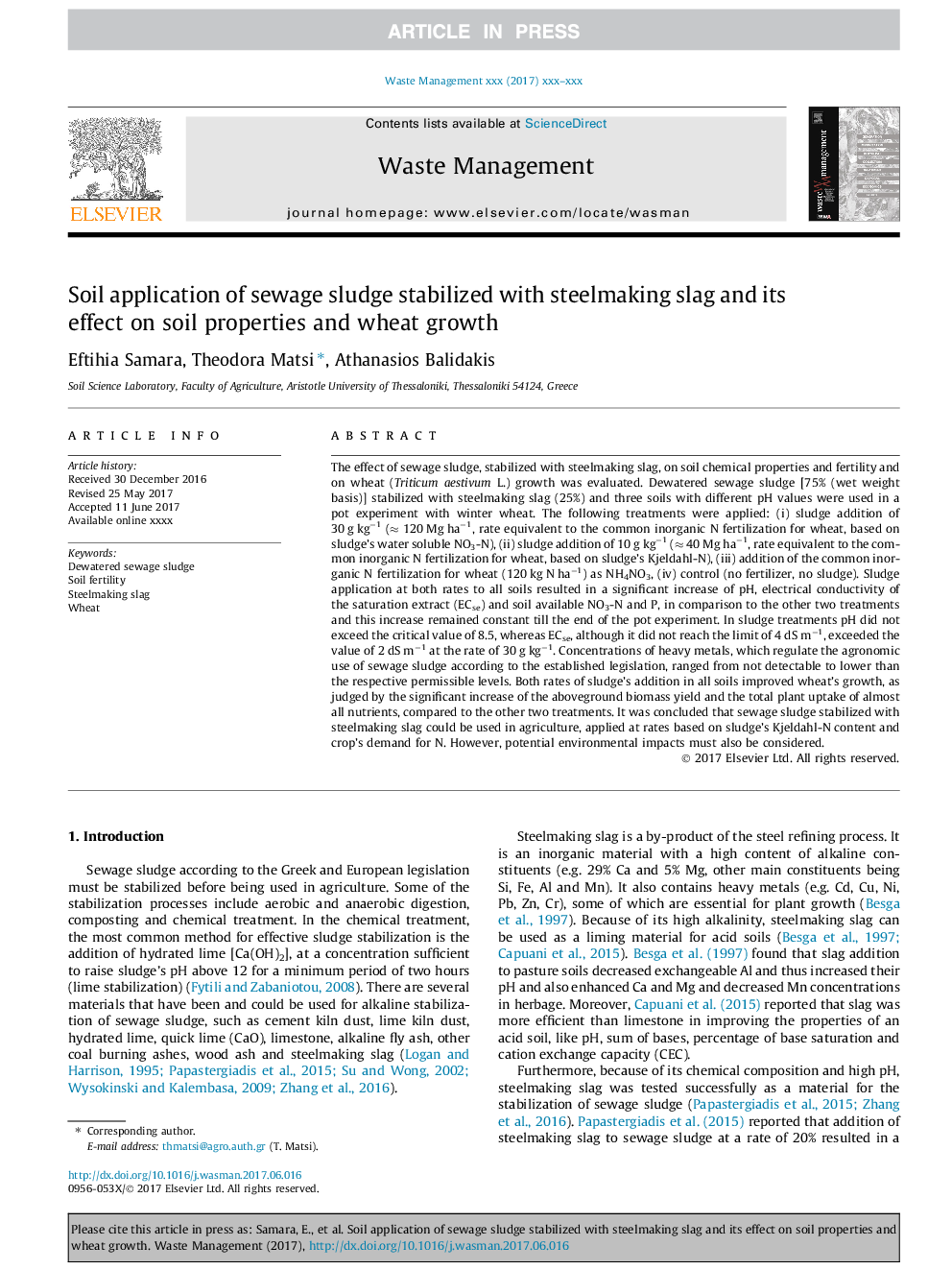| کد مقاله | کد نشریه | سال انتشار | مقاله انگلیسی | نسخه تمام متن |
|---|---|---|---|---|
| 5756585 | 1622618 | 2017 | 10 صفحه PDF | دانلود رایگان |
عنوان انگلیسی مقاله ISI
Soil application of sewage sludge stabilized with steelmaking slag and its effect on soil properties and wheat growth
ترجمه فارسی عنوان
کاربرد خاک لجن فاضلاب تثبیت شده با سرباره فولاد سازی و تأثیر آن بر خواص خاک و رشد گندم
دانلود مقاله + سفارش ترجمه
دانلود مقاله ISI انگلیسی
رایگان برای ایرانیان
کلمات کلیدی
لجن فاضلاب آبی، باروری خاک، سرباره فولاد سازی، گندم،
موضوعات مرتبط
مهندسی و علوم پایه
علوم زمین و سیارات
مهندسی ژئوتکنیک و زمین شناسی مهندسی
چکیده انگلیسی
The effect of sewage sludge, stabilized with steelmaking slag, on soil chemical properties and fertility and on wheat (Triticum aestivum L.) growth was evaluated. Dewatered sewage sludge [75% (wet weight basis)] stabilized with steelmaking slag (25%) and three soils with different pH values were used in a pot experiment with winter wheat. The following treatments were applied: (i) sludge addition of 30 g kgâ1 (â 120 Mg haâ1, rate equivalent to the common inorganic N fertilization for wheat, based on sludge's water soluble NO3-N), (ii) sludge addition of 10 g kgâ1 (â 40 Mg haâ1, rate equivalent to the common inorganic N fertilization for wheat, based on sludge's Kjeldahl-N), (iii) addition of the common inorganic N fertilization for wheat (120 kg N haâ1) as NH4NO3, (iv) control (no fertilizer, no sludge). Sludge application at both rates to all soils resulted in a significant increase of pH, electrical conductivity of the saturation extract (ECse) and soil available NO3-N and P, in comparison to the other two treatments and this increase remained constant till the end of the pot experiment. In sludge treatments pH did not exceed the critical value of 8.5, whereas ECse, although it did not reach the limit of 4 dS mâ1, exceeded the value of 2 dS mâ1 at the rate of 30 g kgâ1. Concentrations of heavy metals, which regulate the agronomic use of sewage sludge according to the established legislation, ranged from not detectable to lower than the respective permissible levels. Both rates of sludge's addition in all soils improved wheat's growth, as judged by the significant increase of the aboveground biomass yield and the total plant uptake of almost all nutrients, compared to the other two treatments. It was concluded that sewage sludge stabilized with steelmaking slag could be used in agriculture, applied at rates based on sludge's Kjeldahl-N content and crop's demand for N. However, potential environmental impacts must also be considered.
ناشر
Database: Elsevier - ScienceDirect (ساینس دایرکت)
Journal: Waste Management - Volume 68, October 2017, Pages 378-387
Journal: Waste Management - Volume 68, October 2017, Pages 378-387
نویسندگان
Eftihia Samara, Theodora Matsi, Athanasios Balidakis,
